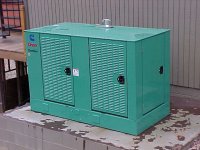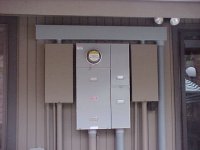Anonymous Poster
Epic Contributor
- Joined
- Sep 27, 2005
- Messages
- 29,678
Fuel, Speed & Size choices
Let's first start with the reality, THERE IS NO FREE LUNCH.
Natural gas is NOT an assured fuel supply for a generator, especially in a power outage situation. Natural gas pipelines are no longer pumped by the Cooper Bessimer class engines that once ran off the gas line, and boosted the pressure along the line. In today's world, most of that pumping is done electricly, and standby generators do not tend to exist at those pumping stations. The thinking of the pipelines is If the power is off, people won't be using much gas, because they won't have the electric to use the gas.
Propane, a generator uses more propane per hour than your house normally uses, so you need a tank that will vaporize sufficient propane to keep the engine running, or you are going to need a liquid propane fuel system on your generator.
You will also need to make sure your propane supplier keeps your tank sufficiently full to sustain a few days of generator operation. The biggest drawback to propane, 10 to 15% loss of tank content per year on stored propane is an industry KNOWN fact. No, they don't tell propane customers about that, but the industry knows it. That is why they will NOT install a gas meter on your propane tank, and charge you for the propane you acutally consume in the house.
Diesel, Higher initial cost, definitely, but we are talking about your house, and if youare going to live there for a while, diesel is one of the best ways to go with a generator. If you are making do in basic housing, Diesel is probably not a good investment, but, if you have a house with ceramic tile, hardwood floors, climate control, and all the fancy kitchen toys, you need to look at a Diesel. Noise is a Non Issue, a properly installed plant can't be heard from 25 feet away, and it will definitely be less noisy than the [censored] kid driving down the street with his booming stereo. Fuel storage is also a Non Issue, unless you are near either ocean or Salt Lake. Bacterial contamination is promarily a salt water operational area consideration. Diesels run very nicely on #2 home heating oil, and there are plenty of homes in this country with a heating oil tank in the basement or garage. There is also a treatment for Diesel fuel that works the way StaBil does on gasoline.
Gasoline, well, we all live and work with that every day, assuming you have a car and lawnmower. The same problems exist with a gas generator that exist with a car. Storage is an issue, but NOT an insurmountable issue. The biggest problem with gasoline machines that I see is people who store their generator and never give it a thought till the lights go out. They usually find the machine has a gummed up carb, or doesn't make electric even if it does run. Gas is still an excellent choice for small plants though.
Speed- 1800 rpm is better than 3600 rpm. 3600 machines wear out the engine twice as fast. 1800 rpm machines have more poles in the generator, 4 instead of 2, and can handle inrush loads better because of more rotating mass.
If you are only going to need the machine a few hours a year, go with cheap. Just remember to change the oil regularly every 8 to 10 hours.
Size - Well, we're talking generators, and here size is important. If you have a house that is heated by a heat pump and you also want to have the capability to run air conditioning during power outages, by all means, install a huge machine. For the rest of us, a real simple size calculation is your monthly electric bill and a calculator. Get an Amprobe, and see what your house currently draws, you'll find you can run on a very small machine. The biggest problems for a generator are well pumps and sump pumps, they aren't engineered to soft start like refridgerators and freezers are. Load calculation tables are a fun thing, and a nice place to start, but most of them are put together by generator manufacturers, to sell bigger machines. Amprobes are cheap on Ebay.
Transferr switching will be covered in the next issue of this thread. You can make your own for less than $25.00, and it works.
Let's first start with the reality, THERE IS NO FREE LUNCH.
Natural gas is NOT an assured fuel supply for a generator, especially in a power outage situation. Natural gas pipelines are no longer pumped by the Cooper Bessimer class engines that once ran off the gas line, and boosted the pressure along the line. In today's world, most of that pumping is done electricly, and standby generators do not tend to exist at those pumping stations. The thinking of the pipelines is If the power is off, people won't be using much gas, because they won't have the electric to use the gas.
Propane, a generator uses more propane per hour than your house normally uses, so you need a tank that will vaporize sufficient propane to keep the engine running, or you are going to need a liquid propane fuel system on your generator.
You will also need to make sure your propane supplier keeps your tank sufficiently full to sustain a few days of generator operation. The biggest drawback to propane, 10 to 15% loss of tank content per year on stored propane is an industry KNOWN fact. No, they don't tell propane customers about that, but the industry knows it. That is why they will NOT install a gas meter on your propane tank, and charge you for the propane you acutally consume in the house.
Diesel, Higher initial cost, definitely, but we are talking about your house, and if youare going to live there for a while, diesel is one of the best ways to go with a generator. If you are making do in basic housing, Diesel is probably not a good investment, but, if you have a house with ceramic tile, hardwood floors, climate control, and all the fancy kitchen toys, you need to look at a Diesel. Noise is a Non Issue, a properly installed plant can't be heard from 25 feet away, and it will definitely be less noisy than the [censored] kid driving down the street with his booming stereo. Fuel storage is also a Non Issue, unless you are near either ocean or Salt Lake. Bacterial contamination is promarily a salt water operational area consideration. Diesels run very nicely on #2 home heating oil, and there are plenty of homes in this country with a heating oil tank in the basement or garage. There is also a treatment for Diesel fuel that works the way StaBil does on gasoline.
Gasoline, well, we all live and work with that every day, assuming you have a car and lawnmower. The same problems exist with a gas generator that exist with a car. Storage is an issue, but NOT an insurmountable issue. The biggest problem with gasoline machines that I see is people who store their generator and never give it a thought till the lights go out. They usually find the machine has a gummed up carb, or doesn't make electric even if it does run. Gas is still an excellent choice for small plants though.
Speed- 1800 rpm is better than 3600 rpm. 3600 machines wear out the engine twice as fast. 1800 rpm machines have more poles in the generator, 4 instead of 2, and can handle inrush loads better because of more rotating mass.
If you are only going to need the machine a few hours a year, go with cheap. Just remember to change the oil regularly every 8 to 10 hours.
Size - Well, we're talking generators, and here size is important. If you have a house that is heated by a heat pump and you also want to have the capability to run air conditioning during power outages, by all means, install a huge machine. For the rest of us, a real simple size calculation is your monthly electric bill and a calculator. Get an Amprobe, and see what your house currently draws, you'll find you can run on a very small machine. The biggest problems for a generator are well pumps and sump pumps, they aren't engineered to soft start like refridgerators and freezers are. Load calculation tables are a fun thing, and a nice place to start, but most of them are put together by generator manufacturers, to sell bigger machines. Amprobes are cheap on Ebay.
Transferr switching will be covered in the next issue of this thread. You can make your own for less than $25.00, and it works.

